Annual cicadas of Indiana (IN):
All cicadas appear every year unless otherwise noted.
Cicadettana calliope calliope (Walker, 1850) aka Southern Grass Cicada
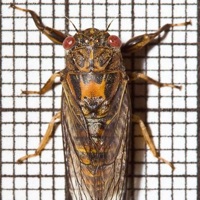
Megatibicen grossus (Fabricius, 1775) aka Northern Dusk Singing Cicada formerly Megatibicen auletes
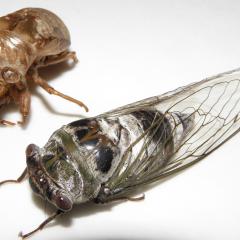
Megatibicen pronotalis walkeri Metcalf, 1955 aka Walker’s Cicada
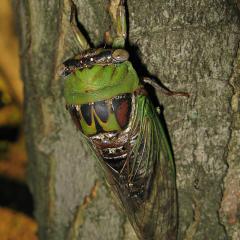
Neocicada hieroglyphica hieroglyphica (Say, 1830) aka Hieroglyphic Cicada
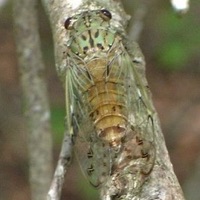
Neotibicen lyricen engelhardti (Davis, 1910) aka Dark Lyric Cicada
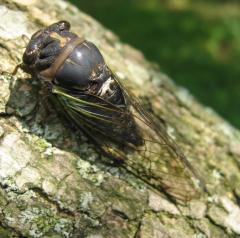
Neotibicen pruinosus pruinosus (Say, 1825) aka Scissor(s) Grinder
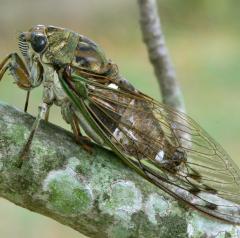
Neotibicen robinsonianus Davis, 1922 aka Robinson’s Annual Cicada or Robinson’s Cicada
Neotibicen tibicen tibicen (Linnaeus, 1758) aka Swamp Cicada, Morning Cicada
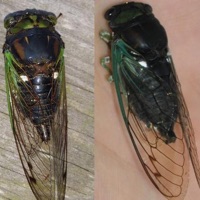
Periodical cicadas of Indiana (IN):
Magicicada cassinii (Fisher, 1852) aka Cassini Periodical Cicada or 17-Year Cicada
These cicadas will appear next in 2024 (Brood XIII), and 2025 (Brood XIV). Often they emerge 1 or 4 years earlier than expected.
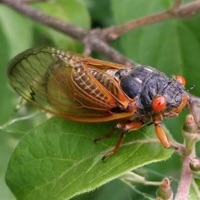
Magicicada neotredecim Marshall and Cooley, 2000 aka 13 Periodical Cicada or 13-Year Cicada
These cicadas will emerge next in 2024 (Brood XIX) and 2028 (Brood XXIII). Often they emerge 1 or 4 years earlier than expected.
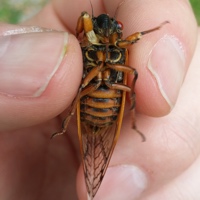
Magicicada septendecim (Linnaeus, 1758) aka Decim Periodical Cicada or Linnaeus’s 17-Year Cicada or 17-Year Cicada
These cicadas will appear next in n 2024 (Brood XIII), and 2025 (Brood XIV). Often they emerge 1 or 4 years earlier than expected.
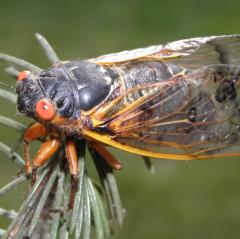
Magicicada septendecula Alexander and Moore, 1962 aka Decula Periodical Cicdada or 17-Year Cicada
These cicadas will appear next in n 2024 (Brood XIII), and 2025 (Brood XIV). Often they emerge 1 or 4 years earlier than expected.
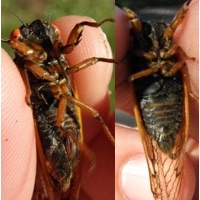
Magicicada tredecassini Alexander and Moore, 1962 aka 13-Year Cicada or 13-Year Cassini
These cicadas will emerge next in 2024 (Brood XIX) and 2028 (Brood XXIII). Often they emerge 1 or 4 years earlier than expected.
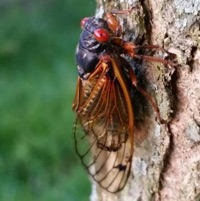
Magicicada tredecim (Walsh and Riley, 1868) aka 13-Year Cicada or 13-Year Decim
These cicadas will emerge next in 2024 (Brood XIX) and 2028 (Brood XXIII). Often they emerge 1 or 4 years earlier than expected.
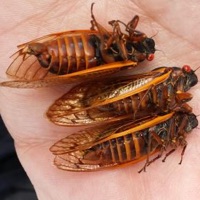
Magicicada tredecula Alexander and Moore, 1962 aka 13-Year Cicada or 13-Year Decula
These cicadas will emerge next in 2024 (Brood XIX) and 2028 (Brood XXIII). Often they emerge 1 or 4 years earlier than expected.
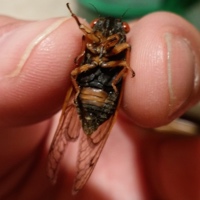
Related Articles
- Brood XIII (13) will emerge in 2024 in Illinois, Iowa, Wisconsin, and Indiana
- Indiana Tibicen
- Brood XXIII photos from 2015, part 2
- Brood X Magicicada photos by Phil Smith from 2004
Name and Location References:
- Full Binomial Names: ITIS.gov
- Common names & locations: BugGuide.net; iNaturalist.com; The Songs of Insects by Lang Elliott and Wil Herschberger; my personal memory.
- Locations: Biogeography of the Cicadas (Hemiptera: Cicadidae) of North America, North of Mexico by Allen F. Sanborn and Polly K. Phillips.
- List of species with MAPs: Biogeography of the Cicadas (Hemiptera: Cicadidae) of North America, North of Mexico [PDF] by Allen F. Sanborn and Polly K. Phillips. Download it once; treasure it forever.
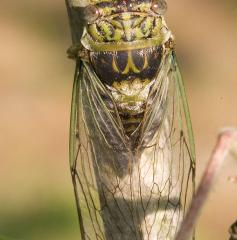
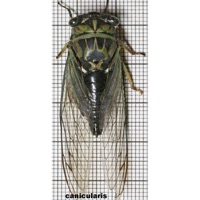
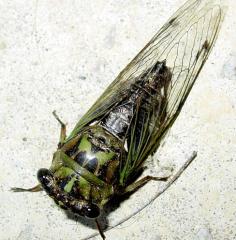
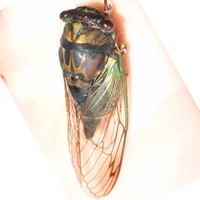
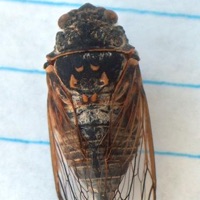
7 replies on “Common cicadas of Indiana”
Question? are there any Cicada that are UNIQUE to Fishers Indiana OR Clay county Indiana I was unable to locate any such data.
Much thanks
Let me think about that.
Checking with source???
I heard that cicadas in Fishers Indiana Clay county Originated in Kentucky. Any truth to that?
Thank You
I haven’t heard that specific story. Do you have a source or link?
Is it next year the cicadas will be in Indiana and what month do they come out and also the month they disappear I have a above pool and was wondering if the cicadas will try to get in my pool do they sting or bite
@Denise, yes 2021 will be a big year for periodical cicadas in Indiana. They do get into pools in the same way dead leaves do. They don’t sting. They don’t bite, but they can pierce and suck — but not out of anger like a wasp — they’re just dumb and mistake fingers for tree branches.